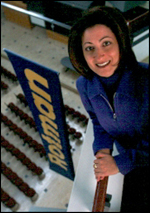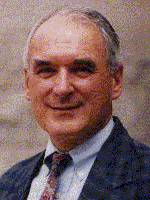 Maria
Rotundo
Maria
Rotundo Assistant Professor, Human Resources and Organizational Behavior, Joseph L. Rotman School of Management
Degrees Ph.D., University of Minnesota
M.I.R., University of Toronto
B.A., University of Western Ontario
Ace it ! Ace it! Show me how to ace the tests!
ODA@UT would like to thank all the OB, OD, and HR professionals and professors who have participated in the development of both the MC test and the Change Management Case.
Format of First Round MC Test
2:00pm - 3:00pm
Even though Organizational Design, Organizational Behaviour and Human Resources are fairly new branches of the social sciences, they have already amassed a vast collection of theoretical and practical material. Managers are expected to know OD & OB theories and frameworks, and possess HR knowledge. These are some of the reasons that this multiple-choice challenge is offered. Please note that we ask you to answer the questions individually.
Each contestant will be given 40
multiple-choice questions on organizational development, organizational behaviour
and human resources. Most questions test for general knowledge while a small
handful ask participants to assume management roles and tackle a case on organizational
behaviour. Participants will write their answers in an answer booklet provided.
The participant who score the highest in the competition will be awarded by ODA@UT and by an organization representative.
Some Sample Questions: (Answers are in bold.)
(1) The primary purpose of job analysis are:
1. Define types of employment to
recruit
2. Provide standards for selecting qualified candidates
3. Facilitate job evaluation
4. Determine whether early retirement programs are to be implemented
a. 1 3 4
b. 1 2 4
c. 2 3 4
d. 1 4
e. 1 2 3
(2) The purposes of orientation are:
1. Introduce new employees to old
employees
2. Brief new employees on company policies and procedures
3. Assess new employees' suitability for further advancement
4. Indoctrinate new employees to the organizational culture
a. 1 2 3 4
b. 1 3 4
c. 1 2 4
d. 2 3 4
e. 1 4
(3) Which of the following HR functions are directly related to employee training and development:
1. Pay and benefits
2. Job analysis
3. Performance appraisal
4. Career planning
a. 1 2 3 4
b. 2 3 4
c. 1 3 4
d. 1 2 4
e. 3 4
(4) What are the major reasons for career planning?
1. Develop and promote employees
2. Improve productivity
3. Reduce turnover
4. Deal with shortage of skilled staff
a. 1 3 4
b. 2 3
c. 1 only
d. All of the above
Format of Second Round Change Management Test
3:45pm - 4:45pm
As you well know, today's business environments heavily rely on teamwork. Many research studies have consistently shown that teams are the most efficient structures when it comes to providing strong integrative solutions to a variety of management problems. These are some of the reasons that the ODA@UT case challenge is offered as a collaborative team project. Please find yourself a partner and enjoy our case!
Description of the Case
A case approximately two pages long will be handed out and participants will have forty minutes to provide recommendations on pre-printed answer booklets. Because of the time constraints that our Judging Panel will face, please limit answers to the maximum of fifteen recommendations. Please make sure that answers are in "point form." Kindly ensure that presentation is effective: language should be concise and writing should be clear and legible. It might be useful to first jot down answers on scrap paper that is provided along with the booklet.
(1) Our participants will be judged
on three scales:
a. Ability to implement traditional management techniques (10 points)
b. Ability to come up with unique integrative solutions (4 points)
c. Ability to present and defend one's solutions (6 points)
(2) The first round of competition will grade the participants on scale (a) -- ability to implement traditional management techniques. Markers will match the answers provided by participants on their answer sheets to the answer key provided by the case writer. Scale (a) will be awarded a maximum of ten points. Teams with the highest grades will enter the second round.
(3) The second round of competition
will grade the participants on scale (b) -- ability to come up with unique integrative
solutions. Judges will assess the creativity of additional answers provided
by the participants, yet not found on the answer key. Scale (b) will be awarded
a maximum of five points. Competitors with the highest grades will enter the
third round.
Format of Final Round of the Competition
Description of the Final Judging
6:00pm - 7:30pm
The third round of competition will grade the participants on scale (c) -- ability to present and defend one's solutions. The top teams will present their answers to all students and judges.Judges will assess the participants' ability to present and defend their solutions. The assessment will be conducted in form of a question/answer session, during which the participants will be asked to come forward and discuss their proposed techniques with the Judging Panel.
Awards will be presented by the judges and by ODA@UT
Books or Websites for References
For participants who have no OB/OD/HR backgrounds, the following is a list of books that outline the basic frameworks and concepts of OB/OD/HR:
Belcourt, M. et. al. 2001. Nelson Canada: Managing Human Resources.
Daft, R. et. al. 2000. Thomson Learning Canada: Organizational Theory and Design.
Greenberg, J. et. al. 2000. Pearson Education Canada: Behaviour in Organizations: Understanding and Managing the Human Side of Work.
Steers, R. 1988. US Scott, Foresman and Company: Introduction to Organizational Behaviour.
Walker, J. 1992. US McGraw-Hill, Inc.: Human Resources Strategy.
MC and Change Management Tests Development Team
 Maria
Rotundo
Maria
Rotundo
Assistant Professor, Human Resources and Organizational Behavior, Joseph L.
Rotman School of Management
Degrees Ph.D., University of Minnesota
M.I.R., University of Toronto
B.A., University of Western Ontario
 Daniel
A. Ondrack
Daniel
A. Ondrack
Professor of Organizational Behaviour, Academic Director, Executive Programs,
Joseph L. Rotman School of Management
Degrees Ph.D., University of Michigan
MBA, University of Toronto
B.Com, University of Alberta
 Neil
Fassina
Neil
Fassina
Lecturer of Negotiation, Joseph L. Rotman School of Management
B.Sc. University of Calgary
 Susanne
Lyle
Susanne
Lyle
B.Sc., University of Toronto
Masters in Organizational Consulting, Ashridge Management College, U. K.
 Franky
Chan
Franky
Chan
B.A., Hong Kong University
Master of Public Administration, University of Southern California
HR Information Coordinator, Human Resources Branch of a Government Ministry
[Bienvenue! Welcome! Show you who'll be there!]
[Click here! Click here! I'll give you some tips!]